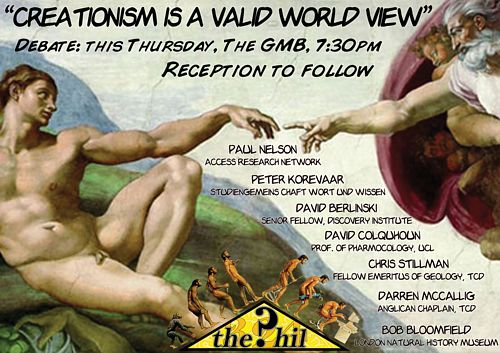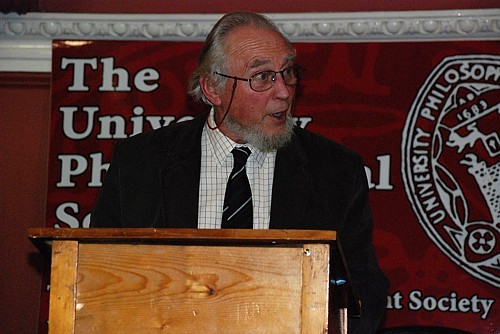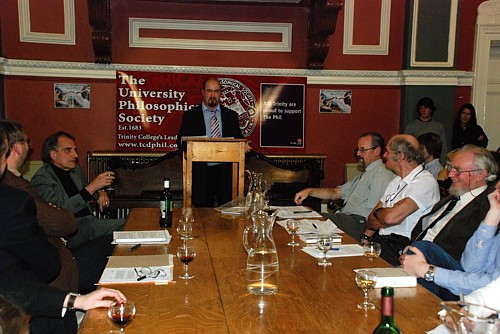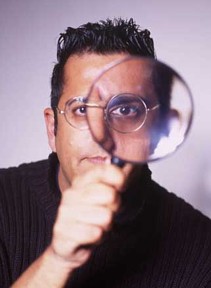William Alderson
Jump to follow-up: Brian Kaplan
| Obama wins! Bush and Blair have gone. Could this mark the beginning of the end of the fashion for believing things that aren’t true? |
Trinity College Dublin: the Phil. “Creationism is a valid world view”
This is the 324th year of the Trinity College Philosophical Society (known locally as the ‘Phil’). Its former members include Bishop Berkeley, Dean Jonathan Swift, Oscar Wilde, Bram Stoker, Samuel Beckett, and E.T.S. Walton . It was founded for “discourse of philosophy, mathematics, and other polite literature ”, and is now a debating society.

The motion was Creationism is a Valid World view. At the dinner before the debate, the students all dutifully stood as one of them recited long graces in Latin both before and after eating. All very Oxbridge. So I wasn’t optimistic. However I hadn’t taken into account the conformist tendencies of undergraduates. Notwithstanding the Latin graces, the result of the debate was very clear indeed.
Result. The Creationists were totally wiped out. Almost the only vote for the motion was a young born-again student, who made a desperately sincere speech.
I don’t need to give the details of what happened, because the opposer of the motion, Bob Bloomfield (of the Natural History Museum) has given an excellent account (The Discovery Institute send big guns to Ireland but only manage to fire blanks) on the Beagle project blog. Two of the proposers were Americans, from the Discovery Institute, and they said what you’d expect: nothing that would impress anyone with any education. I’ll settle for Bloomfield’s description of me as “charmingly irascible”. Irascible, moi? Well it would make anyone mildly irritated to have to spend time arguing about creationism in 2008.
Religion, all religion, seems to me to be boring and not a thing worth wasting good time on thinking about, but the rise of barmy fundamentalism has made it essential, if only so that genetics can be taught without accusations of racism, I’m entirely with Dawkins, I can’t prove that there is no god, and I can’t guarantee
that the bottom of my garden is free of fairies. Both questions merit about the same amount of time, though if pressed, I’d go for the fairies. They are, allegedly, rather better behaved than gods.
The 24th president of the USA said, when asked for his thoughts on evolution, said
“of course like every other man of intelligence and education I do believe in organic evolution. It surprises me that at this late date such questions should be raised”.
Woodrow Wilson, 1922
That, of course, was from a president who has been described as ” leading intellectual of the Progressive Era”.
How things have changed in the time of Tony Blair, George Bush and Sarah Palin. Very few people had such barmy beliefs in 1960, never mind 1922. My thesis is much the same as that of Francis Wheen in “How mumbo-jumbo conquered the world” Sometime around 1980, with the conjunction of Thatcher, Reagan and Khomeini it came into fashion to believe things that aren’t true, just because you wished they were (actually I’d put it a bit earlier than Wheen: arguably it started when the Beatles went to that guru), It was after that when suddenly people started to believe in magic medicine, religious fundamentalism. weapons of mass destruction, and, ahem, that the market would make us rich if only we would remove all the regulations.
Tony Blair defended in parliament the Emmanuel School which is run by a young earth creationist and used car dealer, Peter Vardy. The head of the school, Nigel McQuoid, features strongly on the web site of the Christian Institute, This curious organisation seems to be devoted largely to creationism, homophobia and the virtue of beating children (a search of the site for “corporal punishment” gives 43 hits). An essay by Burns & McQuoid says
“There are those who argue that Science and Christianity can be harmoniously reconciled . ; ;. We cannot subscribe to this view”
The former head of science (yes, of science) at McQuoid’s school, Steven Layfield, had an article on the Christian Institute web site. It vanished as soon as it got some publicity but you can read it at http://www.darwinwars.com/lunatic/liars/layfield.html.
Try this quotation.
“Note every occasion when an evolutionary/old-earth paradigm (millions or billions of years) is explicitly mentioned or implied by a text-book, examination question or visitor and courteously point out the fallibility of the statement. Wherever possible, we must give the alternative (always better) Biblical explanation of the same data.”
| These guys are really at the fruit-cake end of the religious spectrum. In contrast, the young anglican chaplain of Trinity, Darren McCallig, spoke against creationism, eloquently and sensibly. His religiousness did seem at times to be diluted almost to homeopathic extremes, but all the better for that. He seems to have a sense of humour too, judging by the poster for his services. |  click to enlarge |
There is, of course, a very healthy opposition to creationists in the USA too, I like particularly Gerald Weissman’s article “The facts of evolution: fighting the Endarkenment” (it may have been the first time that I saw the wonderful word endarkenment, which describes so well the last 30 years). It starts thus.
“Those of us who practice experimental science are living in the best of times and the worst of times, and I’m not talking about A Tale of Two Cities, but a tale of two cultures. “
Here are a couple of pictures of the meeting.

Chris Stillman (geologist)

Berlinski (left) Luke Ryder (speaking), Bloomfield, DC, Stillman (right)
And some pictures of Dublin here
James Joyce, TCD quadrangle and Molly Malone. Click to view
UCL homeopathy debate
This was organised by the UCL students’ debating society. The Darwin Lecture theatre was surprisingly full for this debate, but they weren’t all students. As usual on these occasions, the homeopaths tried to pack the audience, but this time they failed. That tactic is fair enough I suppose, but it means that the vote failed to tell us anything much about the opinion of students, beyond the fact that not many of them opposed the motion.
There are a few though. To the horror of some of our pharmacology and neuroscience undergraduates, a student society devoted to medicines that don’t work has been started at UCL, for the first time ever. Luckily, it seems to be a rather small society. I was fascinated to see that they are going to hear about the evidence base for complementary therapies, from George Lewith. I had occasion a while ago to look at Dr Lewith’s attitude to evidence: see Lewith’s private clinic has curious standards.
| The proposers were Simon Singh and me. Simon is author of, among other things, Fermat’s Last Theorem and Trick or Treatment. I thought he did an excellent job. Singh pointed out that, contrary to the view propagated by quacks, science likes wacky ideas, as long as you can produce the evidence for them He cited dark matter as an example. |
 |
The main opposer was my old friend Peter Fisher, homeopathic physician to the Queen. It was a pleasure to show the video of Fisher agreeing with me that there is not enough science in homeopathy to justify a BSc degree in it. Fisher, in his papers, strikes me as one of the most honest of homeopaths. He was “very angry” when homeopaths were caught out recommending their sugar pills to prevent malaria. But is his speech, he struck me as less than honest. He cherry-picked the evidence quite shamelessly as usual. And his suggestion that there was an analogy between the ‘memory of water’ and a DVD was disposed of ably by a physics student who spoke from the floor.
The results were too close for comfort, 65 for, 53 against and an amazing 37 abstentions,
Sadly we’ll never know how the students voted, because of the imported homeopaths.
| Dr Brian Kaplan was there. He had given the meeting some advance publicity, in a web posting that also kindly gave publicity to our 2006 letter to the Times. He didn’t like the letter, which is unsurprising given that it turned out to be more effective than we could ever have hoped (see also here). |  |
On the second row, getting very excited, was homeopath Grace Da Silva-Hill and her husband, She runs the ‘Healing with Grace’ business. On her web site she makes the ludicrous claim that
“Homeopathy will treat the cause of your health problem, not just alleviate your symptom”
She also says, inter alia, that
“Homeopathy is effective in treating a wide range of conditions such as: asthma, . . . “
In contrast, the Cochrane review says
“There is not enough evidence to reliably assess the possible role of homeopathy in asthma. “
I have been sent her account of the debate (a reply to a query from the ubiquitous Dana Ullman).
“Hello Dana, The debate, on monday 20th Oct., organised by UCL debating society, was poorly managed, and biased, attended mostly by students, who appear to have gone there to practice their debating skills. The motion was lost by 12 (65 for and 53 against), with 37 abstentions. Peter Fisher put on a good show, and so did his second, in comparison with the rather stale and poor presentation of Simon and Qulquoun (sorry, can never spell this). My husband Ken did a rather
good caricature of him, unfortunately can’t share it here. Pity there were not more homeopaths/supporters there. Kind regards,”
Uhuh. Well, I guess she would say that.
You can judge the critical faculties of Mrs Da Silva-Hill from a comment she left on a piece in the Daily Telegraph, ‘Homeopathy putting lives at risk with claims’. I quote from it verbatim.
“The public does not care about the research available, the public care about having their health problem sorted, where conv. medicine has failed,”
(I apologise for attributing to Mrs Da Silva in the original post a quotation from the Telegraph that appeared above her name but was actually written by somebody else. I apologise also for using a picture of her without permission.)
On the way out of the debate, I walked back to Euston Road with another homeopath, William Alderson, who had come all the way from Kings Lynn to cast his vote. He was earnest and sincere, the conversation was amicable but his idea of evidence was so different from mine that no progress was made. You can read more about Alderson on Dr Aust’s blog.
It’s fascinating stuff.
Follow-up
Dr Brian Kaplan has posted some splenetic comments on this post. I suppose the paranoid tone is an indication that we are winning, but I do wish he’d be a bit more careful about the facts. Let me correct some of them.
(1)Neither the letter of May 2006, nor its follow up in May 2007, was written under the NHS letterhead. The follow-up letter of May 2007 contained the words
“If you have not already reviewed your own trust’s provision, you might find it useful to consider, in conjunction with your Director of Public Health, the paper that we have enclosed which, while not a full review of the scientific position, has been used by other trusts to promote evidence based commissioning.”
The enclosed form was a sample commissioning letter which reproduced the NHS logo with a notice saying “insert your NHS logo here”. The accompanying letter made it perfectly clear that the enclosed form was simply an example to help those who wanted to save money and not an official NHS communication.
(2) Kaplan says I accuse him of lying to his patients, but his reference is to (an old version of) my Dilemmas at the heart of alternative medicine. It says nothing of the sort. I have said many times that I believe homeopaths are perfectly sincere, but they are just deluded. The reference to lying in the ‘dilemmas’ concerns how to get the maximum placebo effect when you know it is a placebo. Homeopaths have not reached that stage yet.
All this information has been available since May 2007. He should have checked.

